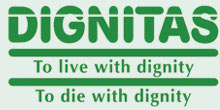 Visits to the end-of-life Centres
Visit to Dignitas
Visits to the end-of-life Centres
Visit to Dignitas
“Dignitas is driven by its belief in freedom of choice and human rights”

My meetings, in 2022 and 2025, were with Silvan Luley. Tall, highly articulate and with instant charm, he was passionate about the task of Dignitas – whilst also being possessed of an engaging sense of humour. He is a team and board member of the Dignitas Association.
We met in the Dignitas office in Forch, an up-market commuter village nine miles from the centre of Zurich. There are no signs on the door. In fact, when I had arrived in 2022 I was still a bit uncertain so I asked a woman with a pram to confirm the address I was at. “Are you looking for Dignitas ?” she asked. When I nodded, she pointed to the building and said “Well, that’s it.” Then she walked away chuckling to herself. My God, did I actually look as though this was my last day on earth ?
This office building is not where the assisted deaths are carried out.
Those take place in a house nine miles away in a village of the “Zurich Oberland”. The house there was bought for the purpose in 2009. Known as “the blue house” it is located on a semi-industrial estate and is next to a large factory storage building. It is covered in blue metallic cladding and, although it is a “house”, it seems to belong in those surroundings. There are pictures of it on the Dignitas website.
Dignitas is driven by its belief in the human right of freedom of choice; the freedom of the individual in its purest sense. It was founded, however, upon the accompanying principles of operating within the law and being a “safe” operation. Safety doesn’t just mean safety for the patient, it means legal safety for the doctors, family and friends of the patients and staff, too.
As Silvan put it,
“When an application for a physician-supported Dignitas-accompanied assisted suicide arrives, we always ask ourselves five questions. How does this look in the eyes of :
• Our Member
• The doctor prescribing the medication
• The member’s family
• The Swiss authorities such as the State Attorney
• Members of our staff.”
In a way that contrasts strongly with Pegasos and Athanasios, Dignitas is very much a membership-based organisation. It has 15,000 members across the world, of whom most will never actually want to make use of an Assisted Voluntary Death (AVD). 34% of its members are from France, Germany and Switzerland itself. 10% are British and 5% are from the USA. Dignitas is the only AVD provider that publishes its annual statistics. These show that its actual AVDs each year bear little relationship to its membership proportions. The total of AVDs handled in 2024 was 280 (only 1.9% of its total membership) and 57 of those were from the USA. France also provided 57. Britain, where the strength of the Dignitas name is so powerful that it has almost become generic for an assisted death in Switzerland, provided just 37.
There are 35 staff but nearly all of these are part time. Dignitas is registered as an “Association” under Swiss Law and files its accounts on that basis. It receives little in the way of donations. It is not a tax-office-registered charity and any donations are not therefore deductible from the pre-tax income of the donor.
In the overall context of the Swiss end-of-life centres in general (remember I have only visited those that take non-Swiss residents), Dignitas is not a big player. The German-speaking arm of Swiss Exit has 140,000 members and the independent French-speaking arm has a further 30,000.
For the end-of-life process itself, Dignitas always prefers its members to drink the medication.
A patient-operated infusion is possible but only for medical reasons. First, the patient must take an anti-emetic medication to stop the stomach rejecting the Pentobarbital. Then, half an hour, later the medication is taken. The member is usually asleep within 3 – 5 minutes and death will occur within 20 to 30 minutes.
Finally, Silvan emphasises that assisted suicide is well-justified on the grounds of suicide prevention. This sounds counter-intuitive but is statistically correct. He also re-iterates that the principal purpose of any AVD centre (he prefers to call them “organisations”) must be the “relief of suffering and ensuring the human right to determine the time and manner of one’s own life, as was acknowledged in 2011 by the European Court of Human Rights” in a case handled by Dignitas. An important part of the work of Dignitas involves “international legal-political work” to implement what Dignitas calls “the last human right”; the website of Dignitas contains a wealth of information about such court judgements and public consultations.
It needs to be a balanced judgement. The “suffering” must be substantial and likely to be without cure. The examples I raised about a fifty-year-old going through a divorce or experiencing financial problems would probably not pass the approval test of a Swiss medical doctor. Silvan pointed out that with any enquiry it is important to look into the cause of the suffering and then, together with the individual, see what the way forward could be.
Read Next Section >


